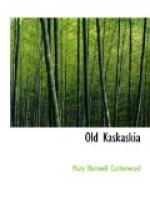“You appear to think a great deal about Monsieur Reece Zhone and his future wife,” said Angelique mischievously.
“I know what you mean,” said Peggy defiantly, “and we may as well have it out now as any time. If you throw him at me, I shall quarrel with you. I detest Rice Jones. He makes me crosser than any other person in the world.”
“How can you detest a man like that? I am almost afraid of him. He has a wonderful force. It is a great thing at his age to be elected to the National Assembly as the leader of his party in the Territory.”
“I am not afraid of him,” said Peggy, with a note of pride.
“No,—for I have sometimes thought, Peggy, that Monsieur Reece Zhone and you were made for each other.”
Peggy Morrison sneered. Her nervous laughter, however, had a sound of jubilation.
The talk stopped there. They could see fog rising like a smoke from the earth, gradually making distant indistinct objects an obliterated memory, and filling the place where the garden had been.
“We must go in and call for candles,” said Angelique.
“No,” said Peggy, turning on the broad sill and stretching herself along it, “let me lay my head in your lap and watch that lovely mist come up like a dream. It makes me feel happy. You are a good girl, Angelique.”
PART THIRD.
THE RISING.
Father Baby’s part in the common fields lay on the Mississippi side of the peninsula, quite three miles from town. The common fields as an entire tract belonged to the community of Kaskaskia; no individual held any purchased or transferable right in them. Each man who wished to could claim his proportion of acres and plant any crop he pleased, year after year. He paid no rent, but neither did he hold any fee in the land.
Early on rainy summer mornings, the friar loved to hoist his capote on the cord, and tramp, bare-legged, out to his two-acre farm, leaving his slave, with a few small coins in the till, to keep shop should any customer forestall his return.
“The fathers of all orders,” explained Father Baby, “from their earliest foundations, have counted it a worthy mortification of the flesh to till the ground. And be ready to refresh me without grinning, when I come back muddy from performing the labor to which I might send you, if I were a man who loved sinful ease. Monastic habits are above the understanding of a black rascal like you.”.
The truth was, the friar loved to play in wet dirt. Civilized life and the confinement of a shop worked a kind of ferment in his wild spirit, which violent dancing somewhat relieved, but which intimate contact with the earth cooled and settled. Father Baby sometimes stripped off his capote and lay down in the hollow between furrows of corn, like a very lean but peaceful pig. He would not have been seen, on any account, and lifted an apprehensive head in the darkness of the morning if a bird rustled past. This performance he called a mortification of his frame; but when this sly churchman slipped up and put on his capote again, his thin visage bore the same gratified lines which may be seen on the face of a child making mud pies.




